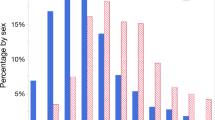Abstract
Parents of gender variant children currently receive conflicting information concerning how to respond to their child’s gender variance. This conflict arises from divisions within the academic literature between what are referred to as either reparative or affirmative approaches to working with gender variant children. The current paper reports on a scoping study designed to understand the support experiences of Australian parents of gender variant children, together with their attitudes towards gender variance. The study was mixed methods in design, including both quantitative and qualitative information gained from 61 parents of gender variant children. The major findings of the project indicate that a formal diagnosis of gender variance appears to facilitate support towards gender variant children and their parents. The study also found conflicting experiences of contact with healthcare professionals, with some participants reporting positive and supportive experiences and others reporting negative interactions with professionals. Finally, the study found that there were gender differences in relation to parental responses, namely that fathers were less supportive of their child’s gender variance. As such, the paper indicates room for improvement in relation to healthcare professionals working with gender variant children and their families, together with insight into the experiences of parents for this group of young people.
Similar content being viewed by others
References
Ansara, Y. G. (2010). Beyond cisgenderism: Counselling people with non-assigned gender identities. In L. Moon (Ed.), Counselling ideologies: Queer challenges to heteronormativity (pp. 167–200). Aldershot: Ashgate.
Brill, S., & Pepper, R. (2008). The transgender child. San Francisco, CA: Cleis Press.
Carroll, L., Gilroy, P., & Ryan, J. (2002). Counseling transgendered, transsexual, and gender-variant clients. Journal of Counseling & Development, 80(2), 131–140.
Dreger, A. (2009). Gender identity disorder in children: Inconclusive advice to parents. The Hastings Center Report, 39(1), 26–29.
Drescher, J. (2002). An interview with GenderPAC’s Riki Wilchins. Journal of Gay & Lesbian Psychotherapy, 6, 87–97.
Ehrensaft, D. (2012). From gender identity disorder to gender identity creativity: True gender self child therapy. Journal of Homosexuality, 59(3), 337–356.
Hill, D., Menvielle, E., Sica, K., & Johnson, A. (2010). An affirmative intervention for families with gender variant children: Parental ratings of child mental health and gender. Journal of Sex and Marital Therapy, 36, 6–23.
Kane, E. (2006). “No way my boys are going to be like that!”: Parent’s responses to children’s gender nonconformity. Gender and Society, 20, 149–176.
Mallon, G. (2000). Practice with transgendered children. Journal of Gay and Lesbian Social Services, 10(3–4), 49–64.
Malpas, J. (2011). Between pink and blue: A multidimensional family approach to gender nonconforming children and their families. Family Processes, 50, 453–470.
Meadow, T. (2011). ‘Deep down where the music plays’: How parents account for childhood gender variance. Sexualities, 14(6), 725–747.
Menvielle, E., & Hill, D. (2010). An affirmative intervention for families with gender-variant children: A process evaluation. Journal of Gay & Lesbian Mental Health, 15(1), 94–123.
Parry, W. (2013, March 6). Gender dysphoria: DSM5 reflects shift in perspective on gender identity. Huffington Post. Retrieved from http://www.huffingtonpost.com/2013/06/04/gender-dysphoria-dsm-5_n_3385287.html.
Pearlman, S. (2006). Terms of connection. Journal of GLBT Family Studies, 2(3–4), 93–122.
Riggs, D. W., Coleman, K., & Due, C. (2014). Healthcare experiences of gender diverse Australians: A mixed-methods, self-report survey. BMC Public Health, 14(1), 230–235.
Riley, E., Sitharthan, G., Clemson, L., & Diamond, M. (2011). The needs of gender-variant children and their parents: A parent survey. International Journal of Sexual Health, 23(3), 181–195.
Saeger, K. (2006). Finding our way. Journal of GLBT Family Studies, 2, 207–245.
Wren, B. (2002). “I can accept that my child is transsexual but if I ever see him in a dress I’ll hit him”: Dilemmas in parenting a transgendered adolescent. Clinical Child Psychology and Psychiatry, 7(3), 377–397.
Wyss, S. (2013). Crisis, acceptance, and advocacy: A supportive guide for parents of trans and gender-nonconforming youth: A review of the transgender child. Journal of LGBT Youth, 10, 163–168.
Zucker, K., & Bradley, S. (1995). Gender identity disorder and psychosexual problems in children and adolescents. New York: The Guilford Press.
Acknowledgments
We acknowledge the sovereignty of the Kaurna people, the First Nations people upon whose land we live and work. Thanks are due to Transcend (http://www.transcendsupport.com.au) for supporting the project. The research was funded by a grant from the Faculty of Social and Behavioural Sciences at Flinders University.
Author information
Authors and Affiliations
Corresponding author
Rights and permissions
About this article
Cite this article
Riggs, D.W., Due, C. Support Experiences and Attitudes of Australian Parents of Gender Variant Children. J Child Fam Stud 24, 1999–2007 (2015). https://doi.org/10.1007/s10826-014-9999-z
Published:
Issue Date:
DOI: https://doi.org/10.1007/s10826-014-9999-z




